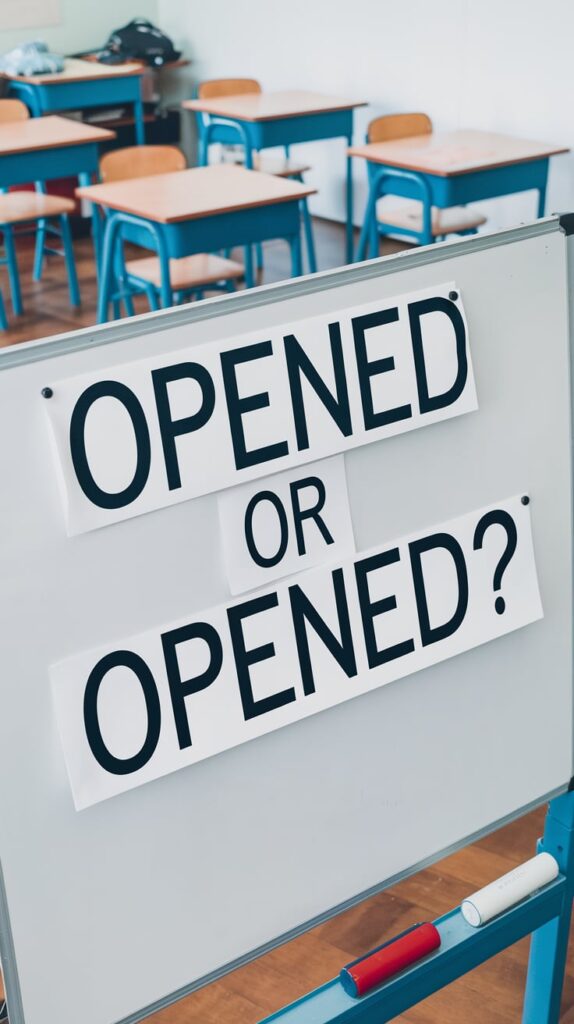Navigating the English language can be a challenging endeavor, especially when it comes to spelling. One common source of confusion for many is the difference between “opened” and the misspelling “openned.”
Understanding the correct spelling and usage of these terms is crucial for effective communication. In this article, we will explore their definitions, contextual usage, and practical tips for improving your spelling skills, all while highlighting the pitfalls of using “openned.”
Which One is Correct? Openned or Opened?

At first glance, the terms “opened” or “openned” may seem similar, but only one is correct. “Opened” is the past tense and past participle of the verb “open.” It indicates the action of making something accessible, whether it be a door, a document, or an opportunity. For instance:
- “She opened the door to let in the light.”
In contrast, “openned” does not exist in standard English. Many people mistakenly believe that doubling the consonant is necessary when forming the past tense of this word, but this is a common misconception. The proper usage is essential not only for clarity but also for maintaining credibility in your writing.
Importance of Correct Spelling
Correct spelling is fundamental in effective communication. Misusing terms can confuse your readers and diminish the professionalism of your writing. For example, using “openned” in place of “opened” can undermine your credibility, especially in academic or professional settings.
Thus, recognizing the distinction between these terms is crucial for anyone seeking to enhance their writing skills.
Understanding “Opened”
The term “opened” signifies the action of making something available or removing an obstruction. It can apply in a variety of contexts, such as physical objects or abstract concepts. Here are a few illustrative examples:
- “The teacher opened the book to the first chapter.”
- “He opened his heart to new experiences.”
In both instances, the use of “opened” effectively conveys the action taken.
The Case Against “Openned”
Conversely, the term “openned” is simply a misspelling. This error often arises from phonetic interpretations of the word. It’s essential to understand that English has specific rules governing the formation of past tenses, particularly for regular verbs.
When a verb ends in a consonant preceded by a vowel (like “open”), the correct way to form the past tense is to add “-ed,” resulting in “opened.” Hence, “openned” is not only incorrect but also contributes to confusion among readers.
read more : Reenforce vs Reinforce: Understanding the Differences and Usage – Grammar Beacon
Real-Life Examples
In everyday conversation, using the correct term enhances clarity and fosters effective communication. Here are some examples that demonstrate the proper usage of “opened”:
“I opened the fridge to grab a snack.”
In this case, the speaker clearly conveys the action of accessing something.
“She opened the curtains to let in some sunshine.”
This sentence illustrates how “opened” communicates the action of making the space brighter.
Common Mistakes
Even seasoned speakers can occasionally slip into using “openned.” This often occurs due to a reliance on phonetics rather than grammatical rules. Missteps can happen in both casual and formal conversations. To combat this, it’s helpful to practice consistently and remain vigilant about correct usage.
Usage in Business and Technology
In the professional realm, precise language is paramount. Missteps can lead to miscommunication or misinterpretation, which could have serious consequences. Here are some examples from business language that highlight the importance of using “opened” correctly:
“The company opened a new branch in the city.”
This sentence conveys growth and expansion, vital for business reports and discussions.
“They opened negotiations last week.”
Here, “opened” signifies the initiation of discussions, crucial for understanding timelines and processes.
Technology Language
In the world of technology, clarity can significantly impact usability and comprehension. Here’s how “opened” is utilized in tech contexts:
“The application opened successfully after the update.”
This illustrates how the term effectively communicates the successful action of launching software.
“Once the file is opened, you can edit it.”
This example reinforces the importance of using “opened” in describing functionality.
The Impact of Incorrect Usage

Using “openned” in business or technology contexts can lead to misunderstandings. For instance, if a report states that a system “openned,” it may confuse readers who are accustomed to the correct terminology. Consistency in language is essential for maintaining professionalism.
Usage in Literature and Art
In literature, the word “opened” often sets the tone and engages readers from the very beginning. Here’s how it appears in writing:
“The novel opened with a vivid description of the protagonist’s home.”
This sentence uses “opened” to create an inviting atmosphere for the reader.
“The gallery opened to an enthusiastic crowd.”
In this case, “opened” conveys the excitement surrounding an artistic event.
Artistic Context
Art critiques frequently utilize “opened” to describe the impact of an exhibition or artwork:
“The artist opened a dialogue about social issues through her work.”
This example emphasizes how “opened” can illustrate deeper meanings.
“The exhibition opened with a thought-provoking installation.”
Here, the term sets the stage for understanding the significance of the artwork.
The Role of Language in Art
Using precise language in literature and art criticism is crucial for conveying complex ideas and emotions. Misusing terms like “openned” can dilute the richness of the discussion. Readers expect accuracy and clarity, especially when engaging with art and literature.
Usage in Sports and Events
In the realm of sports, clarity is essential for maintaining an engaging narrative during commentary and reporting. Here are some examples:
“The match opened with an incredible goal.”
This sentence conveys excitement and immediacy, crucial for sports reporting.
“The tournament opened last week with a grand ceremony.”
Here, “opened” effectively communicates the initiation of a significant event.
Event Context
Similarly, in the context of events, precise language enhances understanding and engagement:
“The festival opened to a large crowd.”
This example highlights the immediate impact of an event.
“They opened the ceremony with a traditional dance.”
This illustrates how “opened” can convey the richness of cultural events.
The Importance of Accurate Language
Using “openned” in sports or event contexts can lead to confusion and a lack of professionalism. Commentators and writers must adhere to accurate language to maintain clarity and credibility.
Why is “Openned” Not a Valid Word in the English Language?
The English language has specific rules for verb conjugation, particularly for regular verbs. The formation of the past tense generally involves adding “-ed.” Since “open” ends in an “n,” the proper form becomes “opened.”
read more : Emersion Vs Immersion: Meaning, Differences, and Examples – Grammar Beacon
Phonetic Misinterpretation
The confusion surrounding “openned” often stems from phonetic interpretations. When spoken, the word may sound like it requires a doubled consonant, but this is misleading. Emphasizing the importance of correct spelling will help reinforce good habits.
Common Reasons for Spelling Errors
- Phonetic Influences: Many people rely on how words sound rather than established spelling rules.
- Lack of Exposure: Limited reading can lead to unfamiliarity with correct forms.
- Typing Mistakes: In the digital age, typos can easily occur, contributing to errors like “openned.”
Understanding these factors can help individuals become more mindful of their spelling choices.
How Can One Improve Their Spelling Skills to Avoid Using Incorrect Words Like “Openned”?

Improving spelling skills can greatly enhance your writing. Here are some effective strategies to consider:
Read Regularly:
Engaging with a variety of texts exposes you to correct spelling and usage.
Use a Dictionary:
When in doubt, a dictionary can serve as an invaluable resource for clarifying meanings and spellings.
Practice Spelling:
Regular writing and spelling exercises can reinforce your skills. Consider keeping a journal or writing essays on topics that interest you.
Understand Spelling Rules:
Familiarizing yourself with common spelling rules helps mitigate errors. For example, understanding how to apply the “-ed” rule effectively can reduce mistakes.
Seek Feedback:
Sharing your work with others can provide insights and catch mistakes you might overlook. This can be especially helpful in a classroom or workshop setting.
Utilize Spell-Check Tools:
While not perfect, spell-check software can help catch many common errors. However, do not rely solely on these tools; it’s important to develop your skills.
Engage in Spelling Games:
Incorporating games can make learning fun. Use apps or online platforms that focus on spelling to practice in an enjoyable way.
Create Flashcards:
For commonly misspelled words, create flashcards to reinforce correct spellings. Regular review of these cards can aid memory retention.
Join a Writing Group:
Engaging with a community of writers can provide support and encouragement while also exposing you to diverse styles and vocabulary.
Synonyms for Varied Expression
If you’re looking to diversify your vocabulary, consider using these synonyms for “opened”:
- Unsealed
- Unlocked
- Revealed
- Unwrapped
- Accessible
- Exposed
Each of these alternatives conveys a slightly different meaning, so select the one that best fits your context. For example, “unsealed” might be more appropriate when discussing containers, while “revealed” works well in more abstract contexts.
What is the Past Perfect Tense of Open?
The past perfect tense of “open” is “had opened.” This construction indicates that an action was completed before another action in the past. For example:
- “By the time we arrived, she had opened all the gifts.”
Using this tense effectively adds depth to your writing and clarifies the sequence of events.
What is the Proper Tense of Open?
The verb “open” has various forms:
- Present: open
- Past: opened
- Present Participle: opening
- Past Participle: opened
Understanding these forms allows for accurate sentence construction. Being mindful of these tenses will help you articulate your thoughts more clearly.
Does the Word Opened Exist?
Yes, “opened” is a legitimate and commonly used word in the English language. Its proper usage is essential for clear communication. Misusing the term can lead to confusion and hinder effective dialogue.
What’s Another Way to Say Opened Up?
If you’re searching for variations, consider phrases like “unlocked” or “revealed.” Each provides a different nuance that can enrich your writing. For instance, using “unlocked” might imply a more physical action, while “revealed” suggests uncovering something hidden or unknown.
What Does the Idiom Open To Mean?

The idiom “open to” means to be receptive or willing to consider new ideas or opportunities. For example:
- “She is open to suggestions regarding the project.”
This usage conveys a willingness to listen and adapt, which is vital in collaborative environments.
Exploring Phrasal Verbs
A common phrasal verb associated with “open” is “open up.” This phrase often means to become more communicative or honest. For instance:
- “He finally opened up about his feelings.”
This usage illustrates vulnerability and connection, which are crucial for building relationships.
read more : Exploring Verbs That Start with M – Grammar Beacon
Conclusion
Mastering the difference between “opened” or “openned” can significantly enhance your writing skills. By focusing on correct spelling and usage across various contexts—like everyday conversation, business, literature, and more—you can communicate more effectively.
Remember, the key to improvement lies in regular practice and a willingness to learn. Keep these strategies in mind, and you’ll avoid common pitfalls in spelling. With diligence and commitment to accuracy, you can enhance your writing and make a lasting impression on your readers.
Now go forth and write with confidence, knowing the difference between “opened” or “openned” will only bolster your communication skills!

James Logan is a seasoned blogger and language enthusiast behind Grammar Beacon. With years of experience in grammar and writing, James shares his expertise through insightful and engaging content. His passion for clear communication and linguistic precision shines in every post, making complex grammar concepts accessible and enjoyable for readers. Follow James for expert advice and tips to refine your writing skills.







